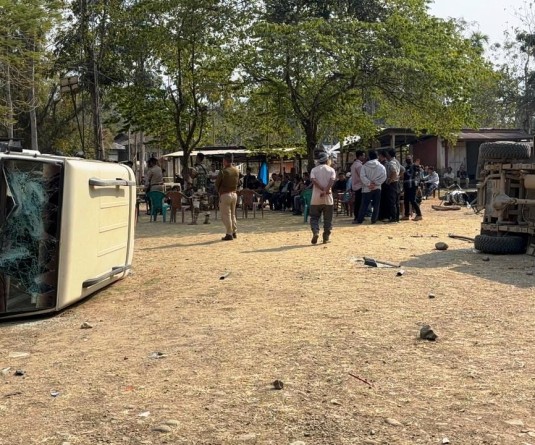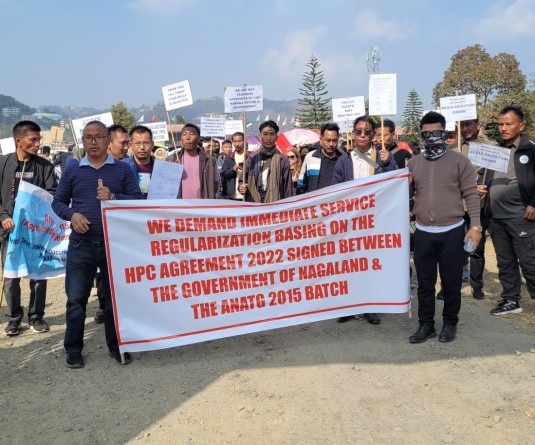
Churachandpur, March 23 (MExN): A one-day consultation on Peace and Human Rights in Burma (Myanmar) expressed doubt if Burma’s current economic and democratic reforms are benefitting a majority of the population, especially the ethnic peoples. The consultation, held today at EBCC Conference Hall, New Lamka in the Churachandpur district of Manipur, was organised by Burma Centre Delhi (BCD) and hosted by Zomi Human Rights Foundation (ZHRF).
Dr. Tint Swe, former MP of National League for Democracy (NLD in Burma), while extending “full support” to NLD leader Aung San Suu Kyi, expressed optimism about the possibility of positive change in Burma in 2015. But the real problem, he said, was the lack of trust in the army generals ruling the country. With Burma’s open door policy, Dr. Swe said, Western countries are penetrating the country at a rapid pace. However, he described such entry as exploitative. “Burma is going to be exploited by new exploiters,” he remarked. He said while other countries were moving at a fast pace, India was still maintaining its traditional pace. He stressed on the need for India to compete with others. He pointed out that the connectivity between India and Burma is only on paper and in newspapers.
Emphasizing on the importance of ethnic reconciliation, Dr. Swe solicited the support of ethnic groups in India for democracy and the peace process inside Burma.
Chairman of Naga National League for Democracy (NNLD), U Saw Sa said that the present constitution was military-made, while a constitution should be drafted through a people’s mandate. “We don’t yet fully believe them (military government) as they have done many mischievous things in the past and indulged in inhuman activities,” U Saw Sa said. He said that the same people who had harassed civilians were still ruling the country, which is why people hesitate to trust them. He said NNLD demands federalism based on which they want political status in Burma.
Coordinator of BCD, Dr. Alana Golmei spoke on the ‘Ongoing Reform Process in Burma and Role of Civil Society’. Dr. Golmei noted that while major reform efforts were underway in various aspects of national life, some remain sceptical of the reform’s actual effectiveness in practice as significant challenges lie ahead.
Although tentative peace agreements have been signed with prominent armed ethnic opposition groups, there is renewed fighting in Kachin State and northern Shan State, she said. “Without a political solution, genuine democracy will be a distant dream, as will be peace, sustainable and equitable development in Burma,” Dr. Golmei said.
Although natural resources will be largely extracted from ethnic areas, she expressed doubt whether and to what extent the economic reforms will benefit the majority, especially ethnic populations in the borderlands.
On human rights issues, Dr. Golmei remained concerned about the freedom of assembly still being restricted as there are more cases of activists, workers, and human rights defenders charged under the Peaceful Gathering and Demonstration Law. Quoting AAPP-B, Dr. Golmei said there still are 222 political prisoners in Burma. She also said that ‘forced recruitment’ of child soldiers still continues in Burma.
Another coordinator of BCD, Kim, spoke about ethnic grievances and said that the highest percentage of people living in poverty are confined within the ethnic states: Chin state (73%), Rakhine state (44%) and Shan state (33%). He said the ethnic areas lack in electricity supply, proper roads and other basic infrastructures; there is unfair and unjust distribution of revenue extracted from the natural resources by the government.
Kim highlighted some of the demands of the ethnic armed groups which include amnesty/legalization of ethnic groups, cultural and environmental protection, resettlement/integration of refugees and soldiers.
Suanmoi Guite from Indigenous Peoples Human Rights Defender (IPHRD) presented a paper on ‘Deep Rooted Causes of Burmese Refugees and Economic Migrants in Manipur’.
Guite suggested that the international (Indo-Burma) border fencing proposed by MHA in the interest of Indian internal security could deny the cultural rights of the indigenous tribal people across the border. He said the indigenous tribal people across the border known as the indigenous Zo people have been living in Chin State in Burma since “time immemorial”.
He focused on the problems of the indigenous Zo people faced in education, health and development aspects. Instead of accessing health services in Rangoon, it is easier and more convenient to access their right to healthcare in Churachandpur District Hospital or in Public Health Service Centre in Singngat Subdivision, Churachandpur, he added.
Citing little overall development in the international border areas of Burma otherwise, Guite said indigenous people continue to be victimized by army personnel.
K. Filip Sumi from The Morung Express, a daily newspaper based in Dimapur, spoke on the ‘Role of the Media in Peace and Human Rights in the Region (India-Burma)’. He said while the international community is applauding the Burmese government for initiating changes in its transition towards democracy, people are aware that serious human rights abuse continues in Burma. He said Burma’s international image will never reach its peak of acceptance as long it fails to release the remaining political prisoners. Pointing out the importance of media which can be of great assistance in conflict management and peace building, Sumi said the media must go beyond ethnical and responsible reporting and get actively involved in human rights issues.
Stating that the media can play a role in escalating conflicts as well as defuse tension, he said the media should stay clear of judgemental representations and describe reality without embellishment.
Sumi said the media must also try to give publicity to individuals and organisations which are engaged in securing human rights. This will encourage as well as motivate others to do similar work, he added.





